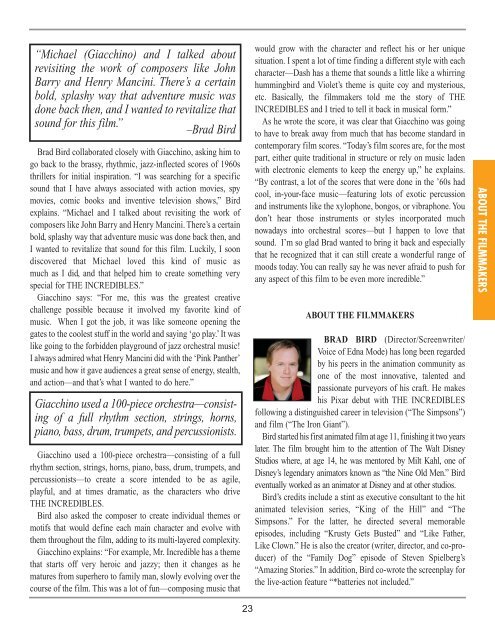Incredible - The Entertainment Magazine
Incredible - The Entertainment Magazine
Incredible - The Entertainment Magazine
Create successful ePaper yourself
Turn your PDF publications into a flip-book with our unique Google optimized e-Paper software.
“Michael (Giacchino) and I talked about<br />
revisiting the work of composers like John<br />
Barry and Henry Mancini. <strong>The</strong>re’s a certain<br />
bold, splashy way that adventure music was<br />
done back then, and I wanted to revitalize that<br />
sound for this film.”<br />
–Brad Bird<br />
Brad Bird collaborated closely with Giacchino, asking him to<br />
go back to the brassy, rhythmic, jazz-inflected scores of 1960s<br />
thrillers for initial inspiration. “I was searching for a specific<br />
sound that I have always associated with action movies, spy<br />
movies, comic books and inventive television shows,” Bird<br />
explains. “Michael and I talked about revisiting the work of<br />
composers like John Barry and Henry Mancini. <strong>The</strong>re’s a certain<br />
bold, splashy way that adventure music was done back then, and<br />
I wanted to revitalize that sound for this film. Luckily, I soon<br />
discovered that Michael loved this kind of music as<br />
much as I did, and that helped him to create something very<br />
special for THE INCREDIBLES.”<br />
Giacchino says: “For me, this was the greatest creative<br />
challenge possible because it involved my favorite kind of<br />
music. When I got the job, it was like someone opening the<br />
gates to the coolest stuff in the world and saying ‘go play.’ It was<br />
like going to the forbidden playground of jazz orchestral music!<br />
I always admired what Henry Mancini did with the ‘Pink Panther’<br />
music and how it gave audiences a great sense of energy, stealth,<br />
and action—and that’s what I wanted to do here.”<br />
Giacchino used a 100-piece orchestra—consisting<br />
of a full rhythm section, strings, horns,<br />
piano, bass, drum, trumpets, and percussionists.<br />
Giacchino used a 100-piece orchestra—consisting of a full<br />
rhythm section, strings, horns, piano, bass, drum, trumpets, and<br />
percussionists—to create a score intended to be as agile,<br />
playful, and at times dramatic, as the characters who drive<br />
THE INCREDIBLES.<br />
Bird also asked the composer to create individual themes or<br />
motifs that would define each main character and evolve with<br />
them throughout the film, adding to its multi-layered complexity.<br />
Giacchino explains: “For example, Mr. <strong>Incredible</strong> has a theme<br />
that starts off very heroic and jazzy; then it changes as he<br />
matures from superhero to family man, slowly evolving over the<br />
course of the film. This was a lot of fun—composing music that<br />
23<br />
would grow with the character and reflect his or her unique<br />
situation. I spent a lot of time finding a different style with each<br />
character—Dash has a theme that sounds a little like a whirring<br />
hummingbird and Violet’s theme is quite coy and mysterious,<br />
etc. Basically, the filmmakers told me the story of THE<br />
INCREDIBLES and I tried to tell it back in musical form.”<br />
As he wrote the score, it was clear that Giacchino was going<br />
to have to break away from much that has become standard in<br />
contemporary film scores. “Today’s film scores are, for the most<br />
part, either quite traditional in structure or rely on music laden<br />
with electronic elements to keep the energy up,” he explains.<br />
“By contrast, a lot of the scores that were done in the ’60s had<br />
cool, in-your-face music—featuring lots of exotic percussion<br />
and instruments like the xylophone, bongos, or vibraphone. You<br />
don’t hear those instruments or styles incorporated much<br />
nowadays into orchestral scores—but I happen to love that<br />
sound. I’m so glad Brad wanted to bring it back and especially<br />
that he recognized that it can still create a wonderful range of<br />
moods today. You can really say he was never afraid to push for<br />
any aspect of this film to be even more incredible.”<br />
ABOUT THE FILMMAKERS<br />
BRAD BIRD (Director/Screenwriter/<br />
Voice of Edna Mode) has long been regarded<br />
by his peers in the animation community as<br />
one of the most innovative, talented and<br />
passionate purveyors of his craft. He makes<br />
his Pixar debut with THE INCREDIBLES<br />
following a distinguished career in television (“<strong>The</strong> Simpsons”)<br />
and film (“<strong>The</strong> Iron Giant”).<br />
Bird started his first animated film at age 11, finishing it two years<br />
later. <strong>The</strong> film brought him to the attention of <strong>The</strong> Walt Disney<br />
Studios where, at age 14, he was mentored by Milt Kahl, one of<br />
Disney’s legendary animators known as “the Nine Old Men.” Bird<br />
eventually worked as an animator at Disney and at other studios.<br />
Bird’s credits include a stint as executive consultant to the hit<br />
animated television series, “King of the Hill” and “<strong>The</strong><br />
Simpsons.” For the latter, he directed several memorable<br />
episodes, including “Krusty Gets Busted” and “Like Father,<br />
Like Clown.” He is also the creator (writer, director, and co-producer)<br />
of the “Family Dog” episode of Steven Spielberg’s<br />
“Amazing Stories.” In addition, Bird co-wrote the screenplay for<br />
the live-action feature “*batteries not included.”<br />
ABOUT THE FILMMAKERS


